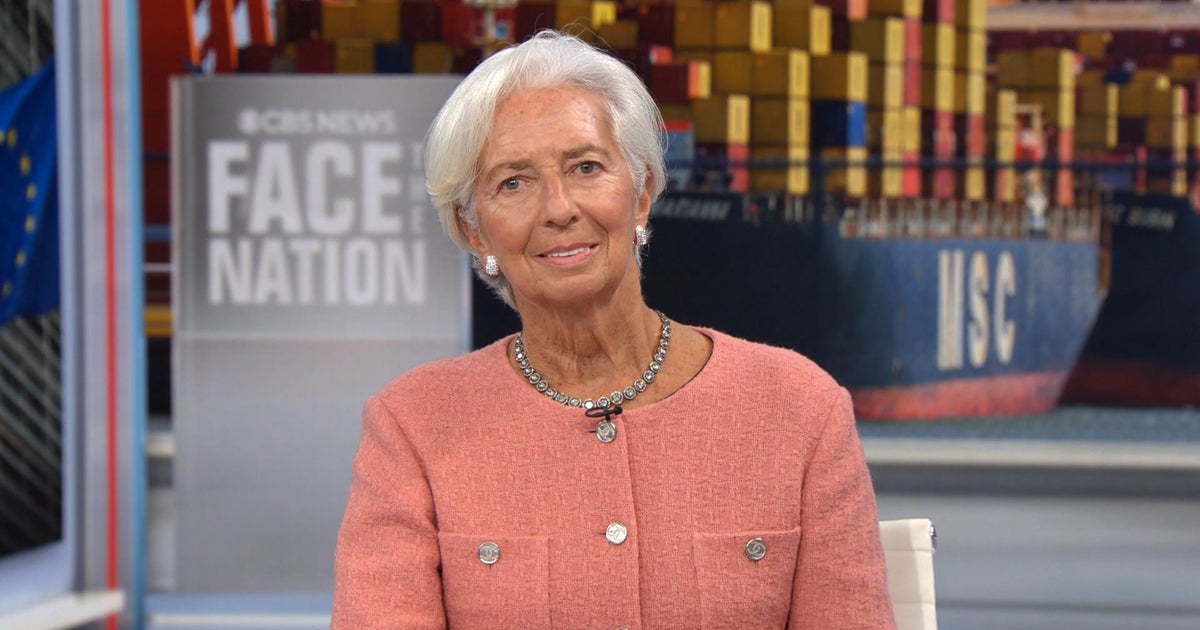

No response returned

The following is the transcript of the interview with Christine Lagarde, president of the European Central Bank, that aired on "Face the Nation with Margaret Brennan" on Oct. 19, 2025.
MARGARET BRENNAN: We're joined now by the President of the European Central Bank, Christine Lagarde. The ECB sets interest rates for many countries in the European Union, which is America's largest trading partner. Good to have you here.
CHRISTINE LAGARDE: Lovely to be back, Margaret.
MARGARET BRENNAN: From where you sit, how would you describe the state of the global economy?
CHRISTINE LAGARDE: In transformation.
MARGARET BRENNAN: Transformation.
CHRISTINE LAGARDE: Transformation, I think caused by a couple of things. One is the tariffs, which have changed the map of trade around the world and reconstituted new alliances and reformed the way in which we trade with each other. I think the second major transformation is the impact of artificial intelligence on everything we do from data management to dating and everything in between.
MARGARET BRENNAN: Absolutely, and it's changing how we even receive the data itself --
CHRISTINE LAGARDE: -- Yep. --
MARGARET BRENNAN: -- to indicate what's happening, but the stock market has been up and down. I want to talk to you on the other side of this commercial break about some of the specifics with these trade wars and what else you're seeing in Europe, but we're going to take a quick break here. And we have more questions, but we have to come back in just one moment.
MARGARET BRENNAN: Welcome back to Face The Nation. We return to our conversation with European Central Bank President Christine Lagarde. You said the economy is in transformation. S&P Global forecasts Trump's tariffs are going to cost global businesses upwards of $1.2 trillion this year, with a lot of those costs passed along to consumers themselves. You've said that many economists overestimated the impact of Trump's tariffs. Does that mean you think we've moved past the point of risk or are we yet to feel the pain?
CHRISTINE LAGARDE: I think we're yet to feel the pain. What we observe, I'll give you some numbers. From Europe to the United States, our goods to the U.S. consumers had a tariff of 1.5. With the tariff that was decided by the U.S. administration, it's gone up to 13%. So the question is, where does this additional 11-ish percentage point go? At the moment, it's one-third on the exporter, so the European company, one-third of the U.S. importer and one-third of the consumer. What will happen, though, is that these two-thirds borne by two corporates, essentially, the exporter and the importer, is based on a squeeze of their margins. How long are they going to put up with a squeeze of the margin, to be seen. And when they don't, because it's becoming too tight, then it will be on the consumer. So it's a question of time.
MARGARET BRENNAN: How much they can stomach the hit --
CHRISTINE LAGARDE: -- Yep. --
MARGARET BRENNAN: -- to their own profits before passing that along. Well, there are talks happening, we understand, between the world's two largest economies. The Treasury Secretary Scott Bessent said on social media he's going to meet with China's Vice Premier in the coming days. This was after he called the negotiator unhinged recently, and President Trump said that starting November 1st there will be new tariffs as retaliation for Chinese restrictions on rare earth exports. These are the largest economies in the world. Where does this go? How damaging does this get?
CHRISTINE LAGARDE: First of all, I would discount a little bit of the positioning at the moment because this is typical of negotiating tactics on both sides. Typical. You show your muscles and you say that you're ready to kill. I'm exaggerating, of course. But people will have to come to the table because it's the interest of both economies, despite the hostility that there is between the two. But China is using an advantage that it has built over the course of time by accumulating rare earth and the ways to refine rare earth and then to sell it to the rest of the world. They have a very, very strong trading position on that front and they're going to use it, which is why I think that on the other side the consumers, that is the United States, Europe and a few other countries around the world, we should, you know, join forces and be a purchasing force on the other side of the table of a selling force.
MARGARET BRENNAN: Well, exactly to that point, there has been frustration on the American side of it that Europe hasn't been standing lock step with the United States when it comes to China. That China has leverage over Europe here.
CHRISTINE LAGARDE: Well, China currently has leverage against most countries that consume rare earth. And I think on the front of rare earth, the Europeans and the Americans are in the same boat and they are rowing in the same direction.
MARGARET BRENNAN: But it's other items that you see --
CHRISTINE LAGARDE: -- Well, I think, you know, it's not for me to say I'm just a central banker, but the European authorities and the U.S. administration see it slightly differently. I think it's the U.S. would see a blanket force. I think the Europeans are more interested in targeting specific industries or specific sectors where they think that it will make a difference. So it's a question of tactics that they will be discussing, I'm sure.
MARGARET BRENNAN: So you have also said recently that you think investors have begun to question whether the dollar would still warrant its status as the ultimate safe haven currency. I mean, the American dollar is one of the strongest weapons, frankly, that the administration has to use. Do you think that it is the rise of cryptocurrency that is most threatening to that or why are you worried?
CHRISTINE LAGARDE: I see signs that the attraction of the dollar is slightly eroded, and future will tell whether there is more erosion of that. But when you look at the rise of cryptos, number one, when you look at the price of gold. Gold is typically, in any situation, the ultimate destination for safe haven. Price of gold has increased by more than 50% since the beginning of the year. --
MARGARET BRENNAN: -- So people are worried. --
CHRISTINE LAGARDE: -- That's a clear sign that the trust in the reserve currency that the dollar has been, is and will continue to be, is eroding a bit. In addition to that, we've seen capital flows outside of the U.S. towards other destinations, including Europe. So, you know, for a currency to be really trusted you need a few things. You need geopolitical credibility. You need the rule of law and strong institutions. And you need, I would call it, a military force that is strong enough. I think on at least one and possibly two accounts, the U.S. is still in a very dominant position, but it needs to be very careful because those positions erode over the course of time. We've seen it with the Sterling Pound, you know, way back after, after the war. But it happens gently, gently, you don't notice it and then it happens suddenly. And we are seeing intriguing signs of it, which is why I think that having a strong institution with the Fed, for instance, is important. Having a credible environment within which to trade is important. So volatility, uncertainty, to the extent it is fueled by the administration, is not helpful to the dollar.
MARGARET BRENNAN: Quickly on Ukraine, President Zelenskyy said he spoke to you recently about using frozen Russian assets. What is fair use in your view?
CHRISTINE LAGARDE: I think fair use would consist of an operational loan that would be using cash balances as collaterals. And I think that the strength of the system should be based on everyone holding Russian assets to do the same thing. So if all those countries holding assets, that have cash balances available as collaterals, go in the same direction of lending the money to Ukraine to be repaid by Russian financing of the reconstruction of Ukraine because Russia is the aggressor, then I think that that would go a long way in convincing Russia that it has to come to the table to negotiate.
MARGARET BRENNAN: Christine Lagarde, always great to hear your insights. We'll be right back.





